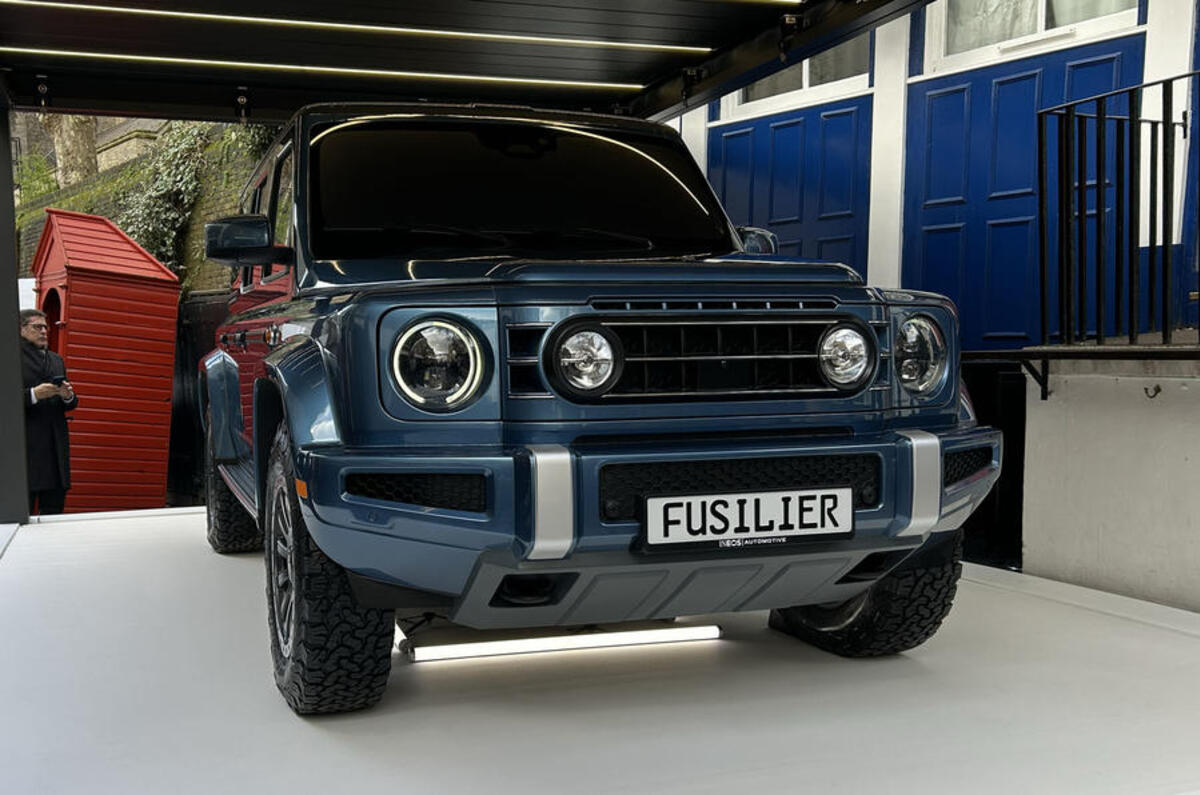Ineos has delayed the launch of its new Fusilier 4x4 until further notice, citing weak demand for electric vehicles and uncertainty around governmental EV policies.
The second model from the 4x4 company of chemical magnate Sir Jim Ratcliffe was due to enter production in 2027, but its launch has now been pushed back indefinitely as Ineos waits for the EV market - and the legislative framework around it – to mature.
While it will be offered with a pure-electric drivetrain, the Fusilier is also planned to be available with a petrol range-extender in a bid to increase its off-road range - and in recognition, Ratcliffe has said previously, of "the clear limitations of battery-electric in certain situations".
At the unveiling of the Fusilier earlier this year, he was vocal about his reticence towards pure-EV propulsion. He said: "We have to have [an EV] whether we like it or not, but we like it, as it’s important to the world.
"The US takes a different view to the EU in wanting to see the trajectory on CO2 go down, but they are open to different solutions and don’t want to force customers.
"Our instinct was to follow the industry with an EV, but a few months ago we paused. My big problem with EVs is that there are two huge failings: they don’t do A to B as a decent journey and you can’t then fill it up."
Now, as first reported by Bloomberg, the company has delayed the launch of the car entirely.
In a statement sent to Autocar, Ineos Automotive said: "We are delaying the launch of the Ineos Fusilier for two reasons; reluctant consumer uptake of EVs and industry uncertainty around tariffs, timings and taxation.
"Charging infrastructure for EVs in most markets continues to grow and consumer confidence will match that, but for the industry to meet net-zero targets there needs to be long-term clarity from policy makers and a number of technology options available considering factors like raw materials, infrastructure and affordability."
The firm said it is "committed to bringing an EV to market, not just because of legislation but because we want to – it is the right thing to do", but as a small-volume manufacture it is only able to "produce vehicles that will sell".
The most recent figures from the Society of Motor Manufacturers and Traders (SMMT) show that demand for electric vehicles in the UK actually rose 6.2% year-on-year in May, to give them a 17.6% market share. The SMMT notes, though, that this "encouraging" performance still falls short of the 22% EV sales mix imposed by the UK government's zero-emission vehicle mandate this year.
Ineos was specifically critical of the ban on combustion car sales that will be imposed in the EU and the UK in 2035 - which Labour has pledged to bring forward to 2030 in the UK if it wins the general election tomorrow (4 July).
The 4x4 firm said a 100% EV sales mandate would not allow it to offer the Fusilier with the range-extender drivetrain, which it touts as a "low-emission solution for longer journeys or where charging is not possible".
Ineos has not given any indication of when production of the Fusilier EV would become viable.








Join the debate
Add your comment
Ineos is a downstream chemicals company, not a conventional oil company.
Doing a range extender IMHO sounds a bit old school, eg BMW i3, but possibly the Fusilier should be launched as a hybrid. I can understand the interest in hydrogen, either as ICE or fuel cells, which may become more mainstream for off highway vehicles, although bio/synfuels may increasingly have their place.
Ratcliffe is the boss of an oil company, so of course he will try to undermine EVs, because they threaten his profits. (The same profits he dodges tax on by living in Monaco.) But talking nonsence about EVs being unviable is obvious Ratcliffe claptrap. Over a million people in the UK happily drive EVs. All he's doing is ensuring that Ineos vehicles won't be adopted by forward-looking, well-informed buyers.
I reckon the Labour 2030 ban will be the first broken promise.
For better or worse it surely makes sense to stick at 2035 so that we are aligned with the EU. Our auto industry is intrinsically linked to Europe and motor manufacturers are not going to organise their operations around one market. Isn't Labour's mantra to be business friendly and offer stability so as to give confidence to invest? Stellantis are already becoming exasperated at UK policy makers and threatening to close their UK plants. The next battle looming must be with Toyota who are nowhere near to meeting the Z EV Mandate. To me it makes sense for the UK to match the EU rules that give credits for hybrids - not just EVs.